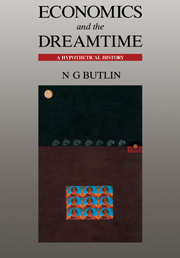Book contents
- Frontmatter
- Contents
- Preface
- Acknowledgements
- Figures
- Maps
- Tables
- Introduction
- Part I The palaeoeconomic history of Aboriginal migration
- Part II Development, structure and function of Aboriginal economy
- Part III Disease, economics and demography
- Part IV The establishment of a bridgehead economy: 1788–1810
- Part V The takeover process: 1788–1850
- 19 Introduction
- 20 British development in the long run
- 21 The hunter gatherers of empire
- 22 British, American and Macassan presence in the takeover
- 23 The major players
- 24 Aborigines and British law
- 25 The economics of takeover
- 26 The composition and demographic impact of disease
- 27 The interaction of disease with resistance, integration and submission
- 28 Conclusions
- Bibliography
- Appendix 1 Preliminary model/checklist of Aboriginal migration to Australia
- Appendix 2 NOAA depth contour maps
- Index
25 - The economics of takeover
Published online by Cambridge University Press: 06 July 2010
- Frontmatter
- Contents
- Preface
- Acknowledgements
- Figures
- Maps
- Tables
- Introduction
- Part I The palaeoeconomic history of Aboriginal migration
- Part II Development, structure and function of Aboriginal economy
- Part III Disease, economics and demography
- Part IV The establishment of a bridgehead economy: 1788–1810
- Part V The takeover process: 1788–1850
- 19 Introduction
- 20 British development in the long run
- 21 The hunter gatherers of empire
- 22 British, American and Macassan presence in the takeover
- 23 The major players
- 24 Aborigines and British law
- 25 The economics of takeover
- 26 The composition and demographic impact of disease
- 27 The interaction of disease with resistance, integration and submission
- 28 Conclusions
- Bibliography
- Appendix 1 Preliminary model/checklist of Aboriginal migration to Australia
- Appendix 2 NOAA depth contour maps
- Index
Summary
Australian history writing on Aborigines has moved from one extreme convention to a second. The first, a long-established one, is that Aborigines were of no significance in British settlement but largely faded away without resistance and with little in the way of incorporation in British economic activity. The second is a very recent revisionist story of extreme violence on both sides, with strong Aboriginal opposition and official and private violence by British settlers (Blainey, 1982; Elder, 1988; Loos, 1982; Reynolds, 1981; Robson, 1983; Turnbull, 1974). The first reflects the fact of Aboriginal depopulation, without inquiring into the reasons. The second derives from an exclusive focus on acts of violence and tends to create an impression of a noble Aboriginal defence of homelands and vicious behaviour by intruders, whether individuals or officials. It is suggested here that both interpretations are open to serious doubt. Let us look first at the mutual economic opportunities that could have led and did lead along two different paths, one to Aboriginal integration and at least partial compensation, the other to violence. There can be little doubt that British entrants did seek to acquire access to resources formerly used by Aborigines. Since they sought to produce their own food supplies and later to produce pastoral products for export, they necessarily sought to occupy Aboriginal lands. Economic interest in a takeover process must be recognised as a major determinant of the outcome.
- Type
- Chapter
- Information
- Economics and the DreamtimeA Hypothetical History, pp. 205 - 214Publisher: Cambridge University PressPrint publication year: 1993



